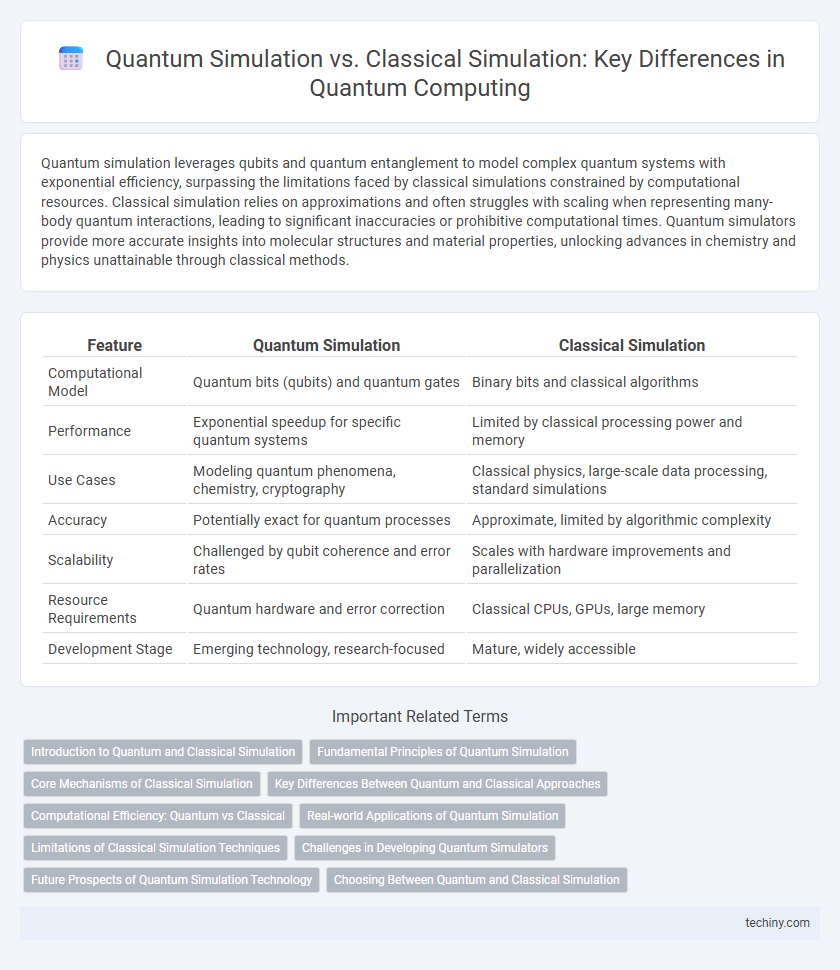Quantum simulation leverages qubits and quantum entanglement to model complex quantum systems with exponential efficiency, surpassing the limitations faced by classical simulations constrained by computational resources. Classical simulation relies on approximations and often struggles with scaling when representing many-body quantum interactions, leading to significant inaccuracies or prohibitive computational times. Quantum simulators provide more accurate insights into molecular structures and material properties, unlocking advances in chemistry and physics unattainable through classical methods.
Table of Comparison
| Feature | Quantum Simulation | Classical Simulation |
|---|---|---|
| Computational Model | Quantum bits (qubits) and quantum gates | Binary bits and classical algorithms |
| Performance | Exponential speedup for specific quantum systems | Limited by classical processing power and memory |
| Use Cases | Modeling quantum phenomena, chemistry, cryptography | Classical physics, large-scale data processing, standard simulations |
| Accuracy | Potentially exact for quantum processes | Approximate, limited by algorithmic complexity |
| Scalability | Challenged by qubit coherence and error rates | Scales with hardware improvements and parallelization |
| Resource Requirements | Quantum hardware and error correction | Classical CPUs, GPUs, large memory |
| Development Stage | Emerging technology, research-focused | Mature, widely accessible |
Introduction to Quantum and Classical Simulation
Quantum simulation leverages qubits and quantum gates to model complex quantum systems exponentially faster than classical counterparts, which rely on bits and deterministic algorithms. Classical simulation struggles with high-dimensional quantum states due to computational resource limitations, whereas quantum simulation exploits superposition and entanglement to efficiently represent and process these states. This fundamental difference enables quantum simulations to solve problems in chemistry, materials science, and cryptography that are currently intractable for classical simulation methods.
Fundamental Principles of Quantum Simulation
Quantum simulation leverages qubits and quantum entanglement to model complex quantum systems that are infeasible for classical computers due to exponential scaling of computational resources. Fundamental principles such as superposition and quantum interference enable quantum simulators to mimic molecular interactions and material properties with unprecedented accuracy. Classical simulation relies on algorithmic approximations and often faces exponential time complexity, limiting its ability to capture intricate quantum phenomena.
Core Mechanisms of Classical Simulation
Classical simulation of quantum systems relies on representing quantum states as high-dimensional vectors and manipulating these vectors using linear algebra operations on classical hardware. Core mechanisms include tensor network methods, such as matrix product states, which approximate quantum states by exploiting entanglement structure to reduce computational complexity. Despite these techniques, classical simulators face exponential scaling challenges when simulating large, highly entangled quantum systems, limiting their effectiveness compared to quantum simulation.
Key Differences Between Quantum and Classical Approaches
Quantum simulation exploits quantum bits and entanglement to model complex quantum systems with exponential efficiency beyond classical capabilities. Classical simulation relies on binary bits and deterministic algorithms, facing exponential resource demands as system size grows. Quantum approaches inherently capture quantum phenomena like superposition and interference, enabling more accurate and scalable modeling of molecular and material behaviors.
Computational Efficiency: Quantum vs Classical
Quantum simulation leverages qubits and superposition to model complex quantum systems exponentially faster than classical simulations, which rely on binary bits and often face exponential time scaling with system size. Classical simulations struggle with high-dimensional Hilbert spaces, causing computational inefficiency as system complexity grows, while quantum simulators efficiently handle these spaces due to inherent quantum parallelism. This results in significant speedups for quantum simulation in problems like molecular modeling and materials science, where classical methods become impractical or infeasible.
Real-world Applications of Quantum Simulation
Quantum simulation leverages quantum processors to model complex molecular structures and chemical reactions exponentially faster than classical simulation, enabling breakthroughs in drug discovery and material science. Real-world applications include optimizing catalysts for clean energy production and simulating protein folding with unprecedented accuracy, which classical computers struggle to achieve due to computational complexity. These advancements position quantum simulation as a transformative tool for industries reliant on precise molecular modeling and quantum dynamics analysis.
Limitations of Classical Simulation Techniques
Classical simulation techniques face exponential scaling challenges when modeling quantum systems, limiting their capacity to accurately represent complex quantum states and entanglement patterns. These methods struggle with the computational resource demands, such as memory and processing power, as the number of qubits increases, resulting in significant performance bottlenecks. Consequently, classical simulators are often constrained to small quantum systems, hindering the exploration of large-scale quantum phenomena essential for advancing quantum computing research.
Challenges in Developing Quantum Simulators
Developing quantum simulators faces significant challenges such as qubit coherence, error rates, and scalability, which hinder accurate representation of complex quantum systems. Overcoming noise and decoherence requires advanced error correction and high-fidelity gate operations to maintain quantum state integrity during simulations. Unlike classical simulators limited by exponential resource scaling, quantum simulators demand precise calibration and control to fully leverage their computational advantages in modeling quantum phenomena.
Future Prospects of Quantum Simulation Technology
Quantum simulation technology promises to revolutionize fields like material science and drug discovery by efficiently modeling complex quantum systems that classical computers struggle to replicate. Advances in qubit coherence and error correction techniques are expected to significantly enhance simulation accuracy and scalability in the next decade. Research investments from leading tech companies and governments highlight the transformative potential of quantum simulation to solve previously intractable problems.
Choosing Between Quantum and Classical Simulation
Quantum simulation excels in modeling complex quantum systems that are infeasible for classical computers due to exponential scaling in computational resources. Classical simulation remains practical for simpler or low-dimensional quantum systems where existing algorithms efficiently approximate behavior. Selecting between quantum and classical simulation depends on the system's complexity, desired accuracy, and available computational infrastructure, with quantum approaches offering unparalleled advantages for many-body quantum phenomena.
Quantum Simulation vs Classical Simulation Infographic

 techiny.com
techiny.com